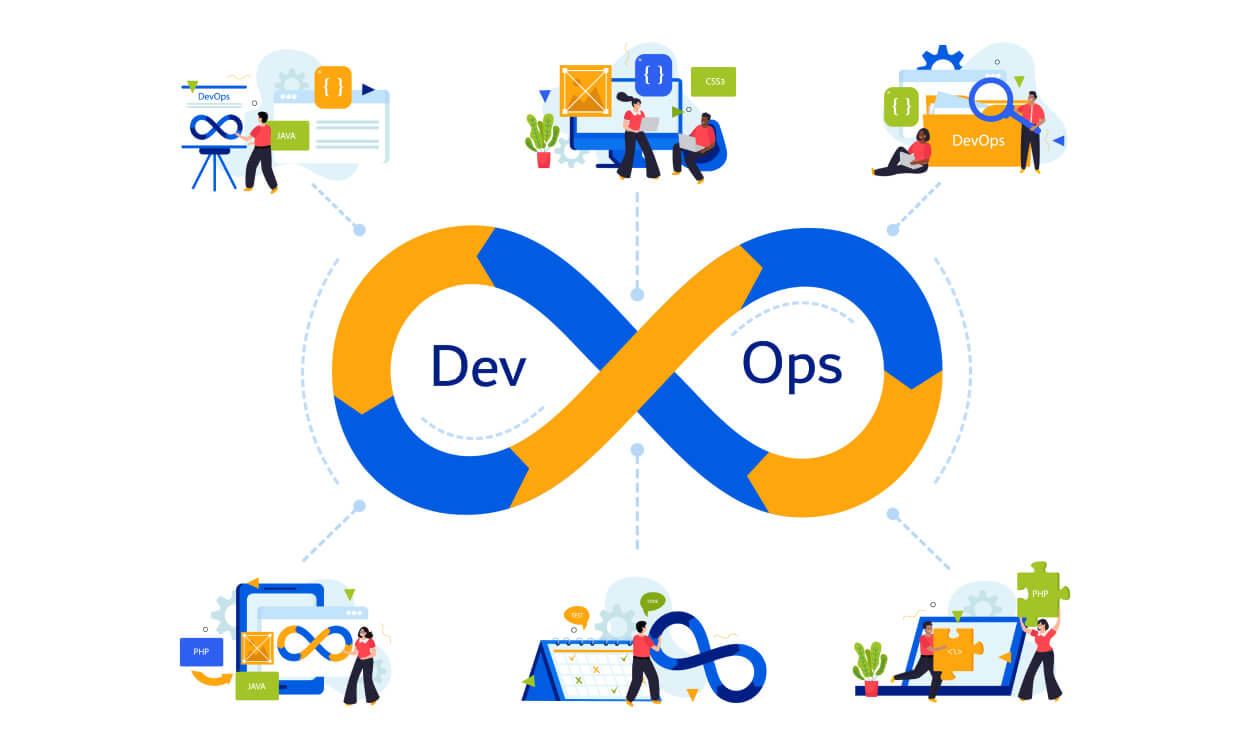The Role of DevOps in Application Engineering
August 16, 2024
Software developers and IT operations teams should work together more and communicate more, according to the DevOps culture and technical approach. Throughout the software development lifecycle, delays, misunderstandings, and inefficiencies resulted from developers and operations teams operating in silos. DevOps seeks to dismantle these divisions and promote a cooperative atmosphere where both groups function as one cohesive unit.
In order to produce software more quickly and with more stability and dependability, DevOps helps companies to automate operations, implement agile approaches, and take advantage of cloud computing technology. To enable quicker iteration and deployment cycles, it places a strong emphasis on continuous integration, continuous delivery, and continuous deployment (CI/CD) techniques.
Roles and responsibilities of DevOps engineers
There are various specialized positions within the DevOps engineer role, each with specific responsibilities. This range of duties and positions that a DevOps engineer can take on constitutes this specialization’s DevOps architect.
- Focuses on creating applications and writing code, integrating DevOps techniques into the development process.
- Works along with developers and IT personnel to oversee code releases, integrating software development, QA, and IT operations while monitoring quick delivery and implementation.
- Specializes in managing infrastructures and services based on Amazon, guaranteeing optimum scalability, security, and performance.
- Ensures that DevOps strategies and procedures are designed and implemented in a way that aligns with the aims and objectives of the enterprise.
The Function of a DevOps Engineer
DevOps is an acronym that combines development and operations. A specialized DevOps procedure aims to establish a continuous delivery workflow, incremental updates to business software through tools, cooperation, and automation. Increasing the pace and caliber of software installation is the aim of a DevOps engineer.
DevOps specialists must comprehend which tools are most appropriate for maximizing the effectiveness of software operations in order to establish this approach. For Example, more secure software upgrades, successful product launches, and improved user experiences are achieved by understanding which tools automate critical operations and generate insights for future production and rollouts.
The Effect of Application Engineering on DevOps
The development and deployment of software applications is being completely transformed by DevOps. It enables companies to improve the overall quality of their software products, expedite development processes, and shorten time-to-market by emphasizing automation, collaboration, and continuous delivery.
The Advantages of DevOps in Application Engineering
Organizations of all sizes can benefit greatly from the implementation of DevOps methods. The following are some main advantages:
Better Teamwork
When developers and operations specialists collaborate from the start to produce high-caliber software, teamwork is improved.
Faster Time-to-Market
Companies can shorten release cycles from months to weeks or even days by using DevOps to speed up the software development lifecycle.
Enhanced Efficiency
Teams may concentrate on more important work when manual chores are automated, which boosts output and speeds up response times.
Improved Quality Control
Higher-quality software is produced as a result of ongoing testing and integration, which helps find and address defects early in the development process.
Flexibility and Scalability
DevOps leverages cloud technology to make apps easily flexible enough to adjust to changing business requirements and grow effortlessly on demand.
The Influence of DevOps on Application Engineering
Continuous Deployment and Integration (CI/CD)
Automating the integration and deployment processes is a key component of DevOps. Continuous Deployment automates the deployment of code updates to production environments, while Continuous Integration guarantees that code changes are consistently integrated into a shared repository. This speeds up the release of new features and bug fixes while lowering manual error rates.
Collaboration and Communication
DevOps encourages improved communication and collaboration by dismantling communication silos between the development and operations teams. By doing this, it is made sure that everyone is in agreement with the objectives, procedures, and roles, which enhances productivity and speeds up problem-solving.
Infrastructure as Code (IaC)
Teams can manage and provision infrastructure using scripts and version control by considering infrastructure configurations as code, as encouraged by DevOps. This lowers configuration drift and increases scalability, resulting in deployments that are more reliable and repeatable.
Feedback and Monitoring
DevOps relies heavily on ongoing logging and monitoring. Teams can promptly detect and resolve problems, obtain input, and make informed decisions to improve application performance and user experience by monitoring the health and performance of apps in real-time.
Automation
To manage repetitive processes like testing, deployments, and environment provisioning, DevOps mostly relies on automation. Automation not only expedites these procedures but also reduces the possibility of human error and boosts deployment dependability.
Security (DevSecOps)
By including security procedures early on in the development process, security is made sure to be a shared responsibility throughout the whole development lifecycle. This entails preserving security best practices during the development and deployment phases as well as incorporating security testing into CI/CD pipelines.
Efficiency and Dependability
Applications that can grow effectively and continue to function reliably under changing loads are made possible by DevOps principles. Architectures that are resilient and scalable are made possible by methods like microservices and containerization, which are frequently combined with DevOps.
Benefits of DevOps in Application Engineering
Streamlined Workflows
Application engineering and DevOps make sure that developers, testers, and operational staff collaborate easily, dismantling organizational silos and speeding up the delivery of products.
Enhanced Efficiency
By combining these approaches, businesses can automate time-consuming processes and free up resources for more strategic endeavors.
Better Software Quality
Organizations can detect errors and problems early in the development lifecycle, which results in higher-quality software, by integrating development, testing, and deployment.
“Aascent InfoSolutions specializes in implementing tailored DevOps strategies that streamline workflows, reduce deployment times, and ensure robust application performance. With their expertise, businesses can achieve faster time-to-market, improved software quality, and a more agile development process, ultimately driving innovation and competitive advantage.”
Wrapping It Up
Through the integration of development and operations methods, DevOps fundamentally changes the way applications are engineered. This results in improved software quality, more effective workflows, and a more adaptable strategy for satisfying user needs. These advantages are driven by DevOps ideas like automation, cooperation, and continuous improvement, which make DevOps an essential part of contemporary application engineering.




